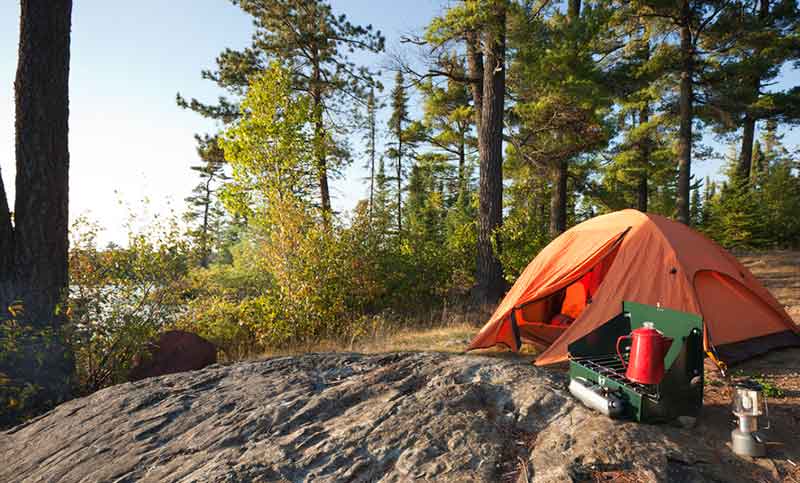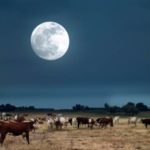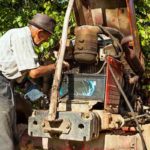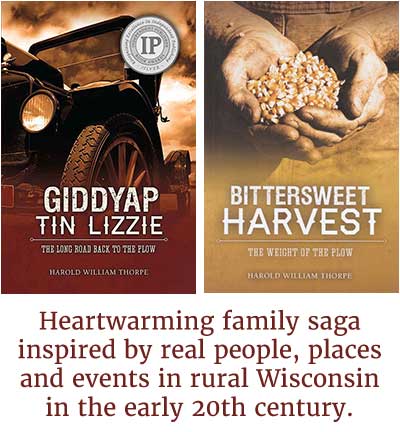A sliver of light tinted the horizon. We awoke in our tent, shivering from the freezing cold. The door flap had been ripped open, and the gale-force wind, blowing from the west, whipped it back and forth. Fresh snow that piled everywhere blew into the tent through the opening. We debated whether we should secure the flap and hunker down in our sleeping bags—or pack up and skedaddle.
But that wouldn’t be the worst of our troubles before the day was over.
Years earlier, I’d helped construct Iowa County’s Governor Dodge State Park. During the intervening years, it had grown larger, more developed, and increasingly beautiful. I was now teaching fifth grade in Janesville, Wisconsin. My good friend, George McKilligan, taught in the same building.
He, his wife, my wife, and I would meet during the winter and, among other things, discuss plans for a summer outing. George had a big tent and a small trailer that was the perfect size to transport that tent. I addition to much food and laughter, we planned a trip to the east for later summer, but I urged the group to do a warm-up trip first. And I knew the perfect spot—Governor Dodge State Park.
April arrived, and although it was a bit early for a camping trip, the weather turned nice, so we decided to venture out and take that warm-up trip I’d been pushing. We packed the tent into the trailer, loaded enough camp food and goods for a couple days’ outing, and headed west toward Iowa County. I was ecstatic, now able to return to one of my favorite places and to show friends the place where I’d spent so many hours working during the summer of 1957. Maybe we could even camp in the horseshoe canyon where I’d done most of my work.
The evening’s temperature was a bit brisk, but comfortable enough for early April. I was delighted when the park ranger said we could camp in the canyon. We built a small campfire, roasted wieners and marshmallows, and spent a pleasant evening enjoying the campfire as it flickered off the greenery all around us. We made a few plans and then hit our sleeping bags early. We’d decided to explore the Dodgeville area the next day. I wanted to show them places that I knew and had enjoyed.
We settled in for the night, and all went well until morning. That’s when we awoke to the drastic turn in the weather, a turn that was not at all conducive to tenting.
The decision was unanimous—we decided to skedaddle.
We quickly threw all the loose items into the car’s trunk. We lowered the tent, folded and loaded it, and snapped the canvas cover tight over the trailer’s top. It didn’t take much more than fifteen minutes before we were off down the road, enjoying the warmth pouring out of the car’s heater. Now bathed in warmness, we remarked about how lucky were to get away so rapidly, and we even congratulated each other on our efficient exit performances. We agreed that we were now ready for our longer summer trip. But our congratulations were premature. We hadn’t yet experienced the worst that day would bring.
We’d driven east for about a half hour when I thought I saw smoke in the air. I voiced surprise that someone would be burning during a snowstorm. We looked around—and soon recognized that the smoke was following us as we drove down the road. There weren’t any flames, but smoke poured out of the trailer. George stopped the car, and he and I ran back towards the smoking trailer.
At first, we weren’t certain what to do. We didn’t want to risk a full conflagration by lifting the canvas cover and adding oxygen to the fuel. But, on the other hand, we couldn’t continue to pull that smudge pot down the highway. We made a quick decision. We unhooked the trailer and he raced to the car and moved it a fair distance up the highway. Meanwhile, I unsnapped the buttons and, while whisking the cover free from its anchor, jumped to the side.
Smoke poured out, but still no flames. By now George was beside me, and we decided to pull the smoldering tent from the trailer onto the roadside. While I threw handfuls of snow on the smoldering canvas, George pulled our small camp shovel from the trunk and heaped more snow on top. We soon extinguished the sparks and turned off the smoke. We then discovered the guilty party. But, I admit, calling our Coleman propane lantern the guilty party is a bit unfair. The culprit was one of us, but neither one brought charges against the other. With all four of us tearing things down and throwing tent parts and equipment into the trailer and car, we didn’t know who had screwed up.
The tent was fixable enough so that we lived in it during our longer summer trip. As with all mishaps, someone had to be blamed, so we left the Coleman lantern home. I’m sure you’ll be happy to hear that whoever the culprit was, he didn’t do serious damage on the next trip.









